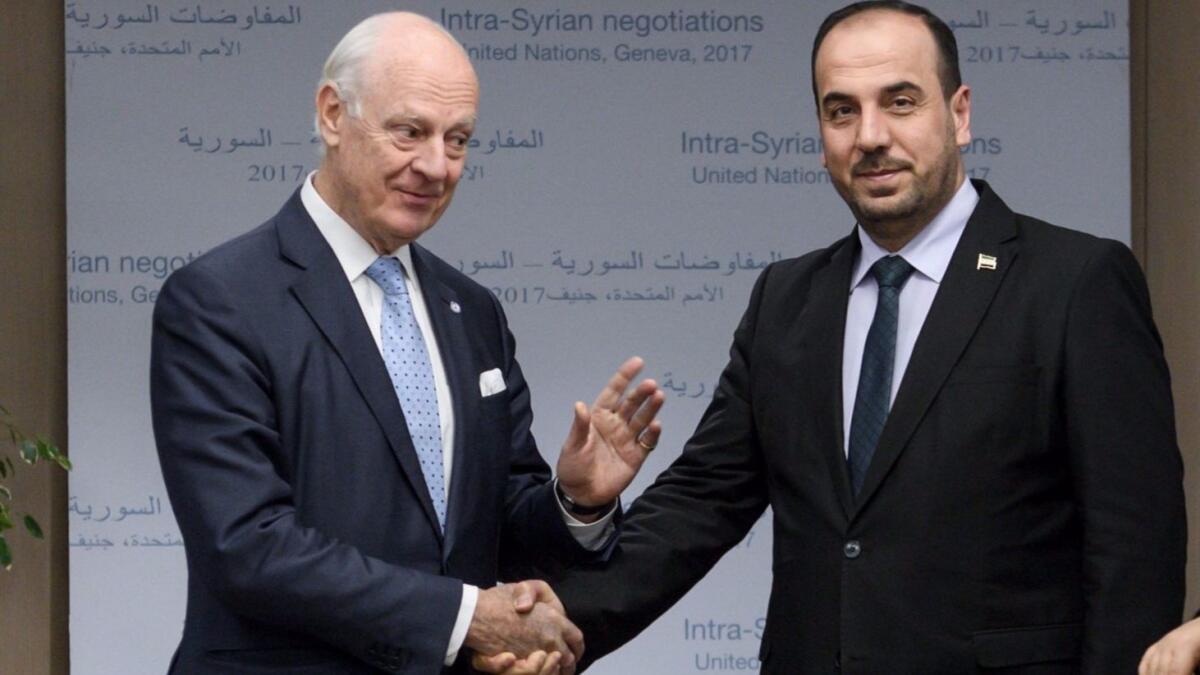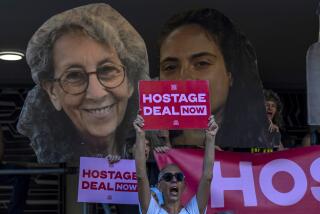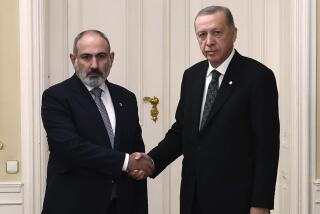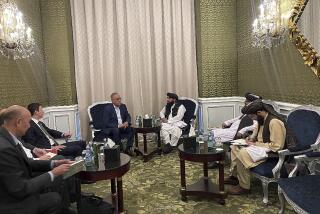Syrian government delegation to join U.N.-sponsored talks a day late

An eighth round of United Nations-sponsored talks aimed at finding a solution to Syria’s ruinous civil war got under way in Geneva on Tuesday without the participation of representatives from the Syrian government, a sign of their displeasure at the continuing insistence of opposition negotiators that President Bashad Assad must go.
But after what were described as “intensive contacts” between Russia and Syria over the past two days, the state-run Syrian Arab News Agency reported that a delegation from Damascus would join the talks on Wednesday. The delegation will be led by Syria’s ambassador to the U.N., Bashar Jaafari, SANA said.
A U.N. spokeswoman, Alessandra Vellucci, told reporters in Geneva on Tuesday that the world body’s special envoy for Syria, Staffan de Mistura, has received assurances that Syrian government representatives will attend.
De Mistura briefed diplomats from the five permanent members of the U.N. Security Council about the talks Tuesday and later met with the head of the opposition’s delegation, Nasr Hariri.
In a statement Tuesday, the opposition delegation said it was ready to hold direct talks with government representatives, while continuing to criticize Assad.
“The Assad regime continues to inflict brutal suffering on the people while procrastinating and making excuses about the diplomacy in Geneva,” Yahya Aridi, spokesman for the grouping known as the Syrian Negotiation Commission, said in the statement.
Previous attempts to negotiate a political solution in Syria have broken down over rebel demands that Assad step down, and there appears to be little hope of a breakthrough now.
At a meeting in the Saudi Arabian capital, Riyadh, last week, representatives of Syria’s notoriously fragmented opposition did not condition their participation in Geneva on Assad’s departure but said in a communiqué that any transition period would not be successful unless Assad first leaves office.
That is a nonstarter for the government and its allies, who see no reason to cede to the rebels at the negotiating table what they have been unable to win on the battlefield.
At Tuesday’s meeting, Russia’s representative to the U.N. office in Geneva, Alexei Borodavkin, urged Western diplomats to “bring the opposition down to earth,” according to Russia’s Tass news agency.
Since Russia entered the war on Assad’s side in 2015, even the rebels’ international allies acknowledge there is no prospect of defeating him militarily. Rebel forces have lost their footholds in all major Syrian cities, and Assad has vowed to reassert control over the remaining parts of the country that have fallen from government hands since the uprising began in 2011.
Russia has been leading parallel talks with Iran and Turkey that have carved out “deescalation zones” aimed at reducing the level of violence between the government and rebel factions in Syria. But the Kremlin said Tuesday that it has postponed plans to host a political dialogue between the rival sides in the Russian city of Sochi until next year, reportedly over Turkey’s objections to the inclusion of a U.S.-backed Syrian Kurdish force that it views as an extension of Kurdish militants who have waged a three-decade-long insurgency within its own borders.
U.N. negotiators have sought to defer a decision about Assad’s future role in hopes of making progress toward a political transition under a road map approved by the Security Council. This week’s talks will focus on the drafting of a new constitution leading to U.N.-supervised elections, Ramzy Ramzy, the deputy U.N. special envoy for Syria, said in Damascus on Saturday.
Twitter: @alexzavis
More to Read
Sign up for Essential California
The most important California stories and recommendations in your inbox every morning.
You may occasionally receive promotional content from the Los Angeles Times.











